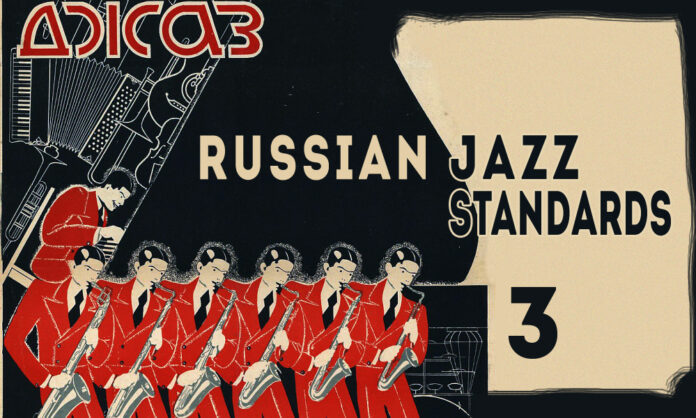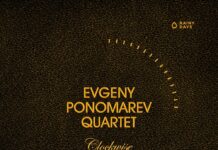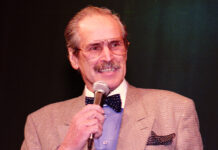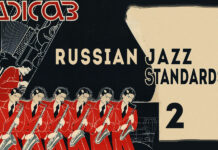Cyril Moshkow,
Jazz.Ru Magazine editor
This humble research was ignited by a simple question from a curious European jazz specialist: if we want to perform the Russian material in jazz, do we have to stick with Tchaikovsky, Rachmaninoff, and Mussorgsky —or Russian jazz musicians have their own corpus of standards they draw from?
In brief: both. Many Russian musicians created impressive jazz compositions based on the material from the great trove of Russian classical music, the works by not just the three composers mentioned above, but also Glinka, Balakirev, Rimsky-Korsakov, Borodin, Scriabin, Prokofiev, Sviridov, and other Russian classical authors from the 19th and 20th centuries. But they also have an equally vast trove of Russian popular songs from the 1920s, 30s, and on to 1980s — the so-called Soviet Song Classics: tunes from certain Soviet-era movies, still watched today and loved by millions; pop songs or show tunes from the past decades, still listened to today because of their cultural significance; and even TV shows theme songs! Wasn’t the American corpus of jazz standards formed from similar sources, along with the tunes composed by jazz musicians? Each big country with a large population and a long history has its own musical culture to be inspired with, so it’s no surprise that Russian jazz musicians not only draw inspiration from American sources, seeking to master the same musical language as their counterparts elsewhere in the world, but also have a rather significant list of Soviet / Russian tunes to treat as jazz standards. Here’s a dozen of such tunes, with their originals and a few chosen jazz versions for each — in four episodes, three songs in each. Thanks for the question, Arlette Hovinga!
Earlier in the series — Episode 1 of 4: And Snow Still Falls; Dark Night; Tired Toys Are Sleeping | Episode 2 of 4: Good Mood Song; I Asked The Ash Tree; Moscow Nights
7. Mama Bear Lullaby (Колыбельная медведицы)
by Evgeny Krylatov (1934-2019), lyrics by Yuri Yakovlev
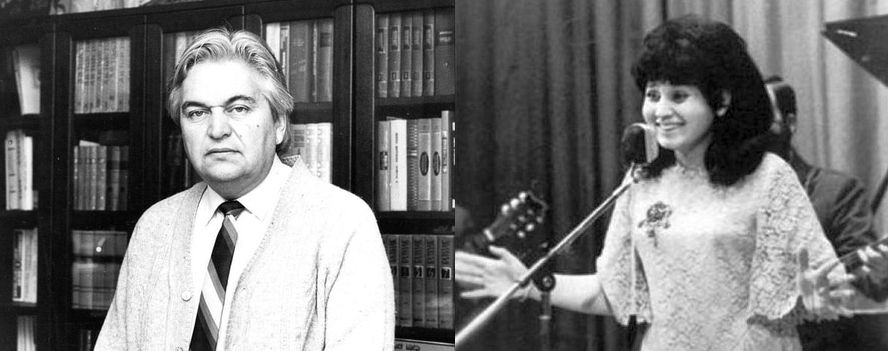
The song was originally written for the 1969 Soyuzmultfilm Studios cartoon, Umka, and performed by the popular 1960s singer, Aida Vedishcheva (born Ida Weiss, 1941):
Jazz Versions
The widest-known jazz version of the tune has been recorded (as «Lullaby of Mommy bear«) in 2007 for the Russian saxophonist Igor Butman‘s album on Sony Classical, Magic Land, with Chick Corea on piano, John Patitucci on bass, and Jack DeJohnette on drums.
Igor Butman keeps performing this tune, still loved by millions in Russia, ever since; in this example, with guitarist Evgeny Pobozhiy, the future winner of the 2019 Herbie Hancock International Jazz Competition (the first Russian jazz musician to hop that high) in Kyzyl, the capital city of the Russia’s remote Siberian autonomous republic of Tuva.
As the original cartoon remains popular even with the 21st century generations, the tune is often performed at the vocal contests for students, including jazz vocal competitions; check out Lisa Trofimova, aged 12, performing this song at the 2021 Piano in Jazz competition in Moscow (with another prominent jazz child prodigy, Alisa Rogulina, on piano):
In 2013, Moscow-based Vetok.net Jazz Quartet, led by bassist Sergei Kondratiev, based their version of the tender lullaby on the swaying bossa nova beat, giving the tune an altogether different sound.
8. Five Minutes (Пять минут)
by Anatols Liepiņš (1907-84), lyrics by Vladimir Livshitz
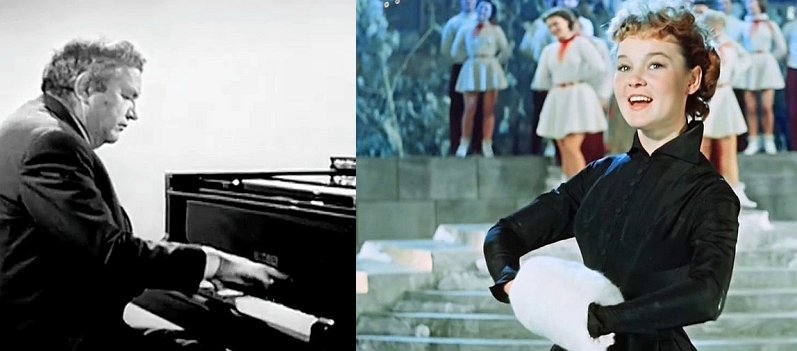
The movie this song first appeared in, The Carnival Night (1956,) had an enduring cultural significance as the first post-Stalin-era Soviet musical comedy. For the first time in years and years, jazz was represented in that film as a positive force, as part of modern Soviet culture, not as part of the rotten decadence of the capitalist West as it was usual before Stalin’s death in 1953. The songs composed for the movie by the Latvian composer Anatols Liepiņš were not exactly American modern jazz of the mid-50s but rather old-fashioned jazzy/swingy pop from earlier decades, but for the Soviet audiences even that was a gulp of fresh air; the debut film by Eldar Ryazanov, who ended up one of the most successful Soviet filmmakers of the following four decades, sold nearly 50 millions cinema tickets in 1956. Another innovation was the recording technology used for The Carnival Night; for the first time in Russian history, the big band score was pre-recorded by the Moscow-based Eddie Rozner Jazz Orchestra, and Lyudmila Gurchenko was singing to their pre-recorded playback in an empty studio with earphones on her head. Witnesses said that almost entire Mosfilm studios personnel assembled behind the studio glass to watch this modern technology wonder to happen.
WARNING: Mosfilm, who owns the rights for the original video, blocks embedding of their video; you may click the YouTube link to try to watch it there, or use Spotify link below.
Jazz Versions:
In Time, the Moscow-based jazz group led by pianist Dmitry Yakovlev, performed this song in 2018 with singer Valentina Neugodnikova.
In 2020, singer Victoria Kaunova and alto saxophonist Ilya Morozov recorded their own version of the song for their latest album, Christmas Wish:
The original movie was New Year’s Eve-themed, which in Soviet times equaled the Christmas theme in American culture: between 1920s and 1980s, the Soviet authorities discouraged Christmas as a religious holiday, and enforced celebration of the New Year’s Eve instead. This is why many jazz versions of the song still are Christmas- or New Year Eve-centered, such as this version, recorded at home by a trio of young Muscovite jazz musicians: singer Alyona Dolbik, bassist Oleg Sharafedinov, and pianist Xenia Rotaeva, who also arranged this version for the 2021 New Year’s Eve celebration.
9. Meadowlands (Полюшко-поле)
by Lev Knipper (1898-1974), lyrics by Viktor Gusev
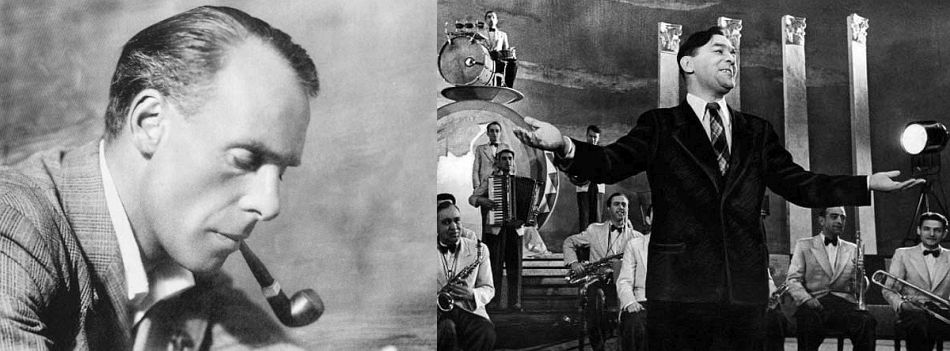
The original version was often considered a folk song, but it was in fact composed by a professional composer, Lev Knipper, whose sister, Olga Chekhova, was a popular German actress: the family they were born to was German Russian. Knipper was prolific as both symphony composer and songwriter; he was even awarded by the Stalin Prize in 1949, for his Soldiers’ Songs suite. Meadowlands was composed in 1933, and for the next fifty years widely performed by numerous folk singers, folk choirs, concert choirs, opera singers, and pop singers of the era, most notably by pop/jazz singer Leonid Utiosov in 1937. Although Utiosov was popular as a jazz singer, his version of the song is by no means jazz: it is performed in the strict tradition of the old Russian military songs.
Jazz Versions:
The tune was widely known in the West as early as early 1940s, when the United States and the Soviet Union were allies against Hitler; Leopold Stokovsky, who arranged the tune for the choral performance at the London 1945 Youth Congress, allegedly called Meadowlands «the best song written in the 20th century.» In 1947, singer/saxophonist Tex Beneke & His Orchestra recorded the song as Meadowlands (Russian Patrol), using an arrangement that Jerry Gray had written in 1943 for the Glenn Miller service band.
When legendary swing era clarinetist Benny Goodman toured the Soviet Union in 1962, his orchestra performed the tune in a slightly more modern arrangement, although drummer Mel Lewis swung it even harder than Tex Beneke’s version (this particular performance was recorded by the producer George Avakian in Moscow):
Swedish pianist Jan Johansson recorded the tune in 1967 as «Stepp, min stepp» (Steppe, my steppe,) which he made the opening track for his album Jazz på ryska (Jazz in Russian). The trio consisted of Johansson on the piano, Georg Riedel on the bass, and Egil Johansen on the drums.
In 2010, Russian pianist Ivan Farmakovsky recorded the tune in his own arrangement for his album The Way Home (Butman Music) with Anton Revnyuk (bass,) Dmitry Mospan (tenor sax) and Donald Edwards (drums):
In 2019, St. Petersburg-based saxophonist Alexey Popov arranged Meadowlands as a mash-up with Miles Davis’ Milestones, and performed it with his band featuring pianist Nikolai Sizov.

